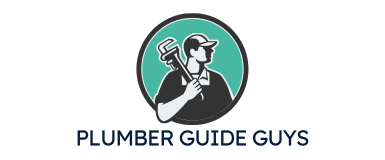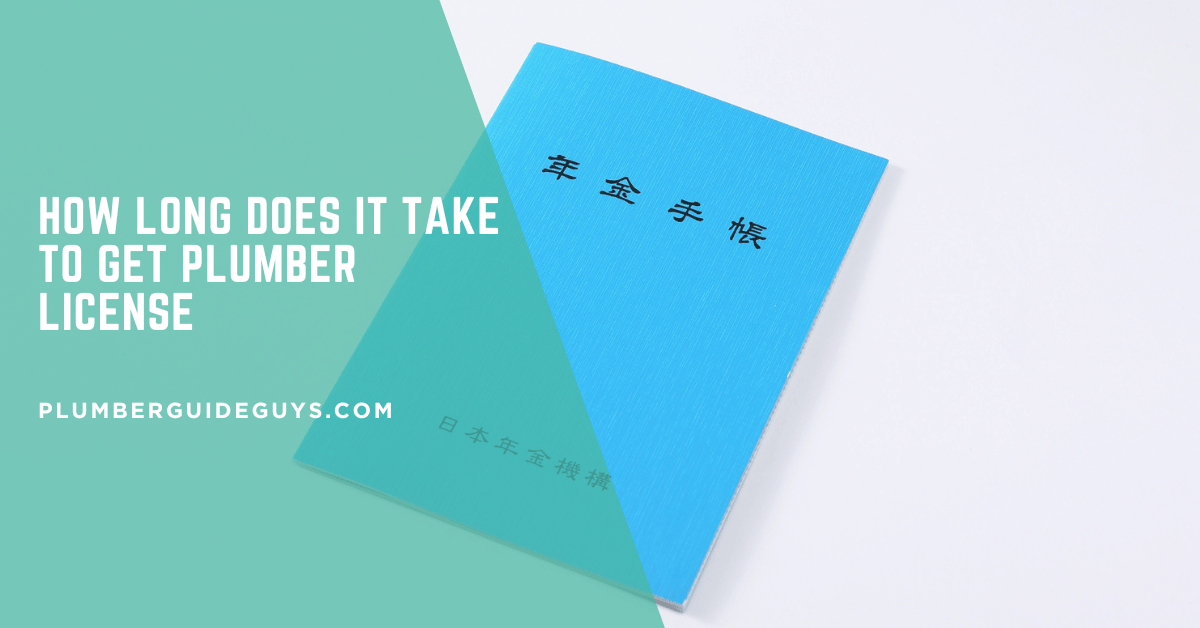How Long Does It Take to Get Plumber License? Did you know only 3% of high school graduates choose plumbing or other skilled trades? This is despite a 5% job growth expected by 2030. Knowing how long it takes to get a plumber license is key for those interested in this career.
Affiliate Disclosure
Plumber Guide Guys is a participant in the Amazon Services LLC Associates Program, an affiliate advertising program designed to provide a means for sites to earn advertising fees by advertising and linking to Amazon.
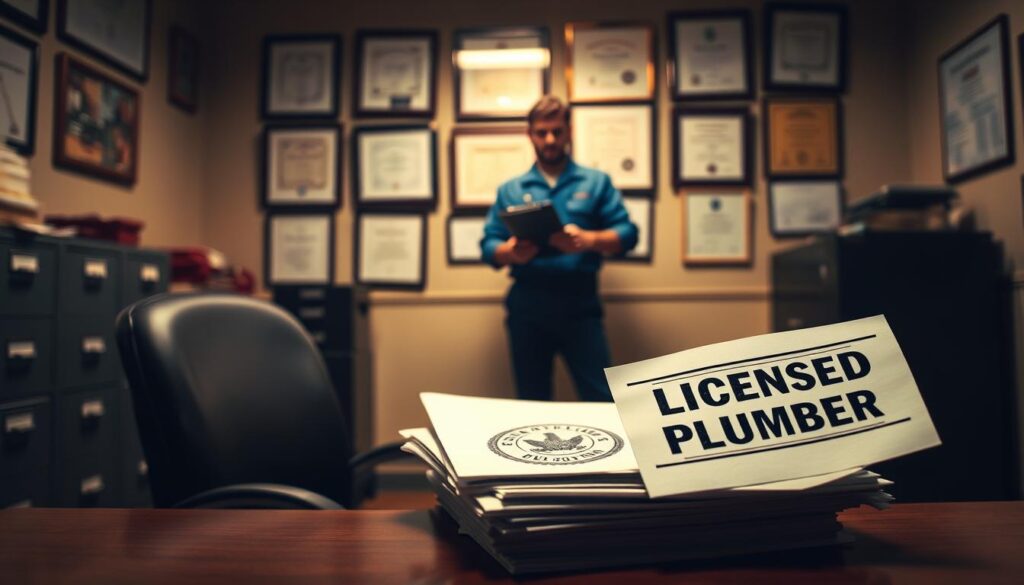
Getting a plumber license needs hard work and careful planning. The journey includes education, apprenticeship, and meeting state plumbing license rules. Depending on your state and education, it can take 4-7 years.
Your journey to becoming a licensed plumber will have classroom learning, hands-on experience, and passing exams. Each state has its own rules, so it’s important to check local requirements for your plumbing license.
Key Takeaways
- Plumbing license timelines vary by state and educational path
- Typical licensing process takes 4-7 years
- Requires combination of classroom and hands-on training
- State-specific requirements impact licensing duration
- Job market shows promising growth for skilled plumbers
Table of Contents
Understanding the Path to Plumbing Licensure
Becoming a licensed plumber is a journey that needs careful planning and dedication. The time it takes to get your journeyman plumber certification varies. It depends on your education, training, and the rules of your state. Each state has its own rules for getting a plumbing license, so it’s important to know what’s required in your area.
To start your plumbing career, you must meet certain basic requirements. The usual steps include:
- Minimum age requirement (usually 18 years old)
- High school diploma or equivalent educational credential
- Completion of an approved apprenticeship program
- Passing a thorough licensing exam
Basic Requirements for Licensing
Most states have specific rules for getting a plumbing license. Your education is a big part of this. Knowing math, physics, and technical drawing well can help you prepare for a plumbing career.
State-Specific Variations
Licensing rules can differ a lot from state to state. Some places have stricter rules, while others are more flexible. It’s key to check your state’s rules to make sure you’re on the right path for your journeyman plumber certification.
Initial Educational Prerequisites
Before starting your plumbing career, you need to finish some educational steps. This usually means a mix of classroom learning and practical training. Technical schools and community colleges often have programs that give you the basics you need.
Pro Tip: Always check with your state’s professional licensing board for the latest licensing rules.
Getting your plumbing license takes time, patience, and a love for learning. By understanding the different parts of the licensing process, you’ll be ready to move forward in your plumbing career.
The Traditional Apprenticeship Route
Starting a plumbing apprenticeship opens the door to a fulfilling career in the trades. It usually lasts 4-5 years. This time lets you learn both hands-on skills and theory, setting you up for success.
Your apprenticeship mixes practical training with classroom learning. You’ll pick up essential skills like:
- Reading complex blueprints
- Installing and repairing plumbing systems
- Understanding local building codes
- Mastering safety protocols
- Developing problem-solving techniques
The program is designed to help you pass the plumber exam. You’ll do about 8,000 hours of on-the-job training and 500-1,000 hours of classroom work, based on your state’s rules.
| Training Component | Average Duration | Key Skills Learned |
|---|---|---|
| On-the-Job Training | 4-5 years | Practical installation techniques |
| Classroom Instruction | 500-1,000 hours | Theoretical knowledge and code compliance |
| Total Apprenticeship | 4-5 years | Comprehensive professional preparation |
Experienced master plumbers will oversee your apprenticeship. Learn more about the path to becoming a licensed plumber. See how this traditional route can start your plumbing career.
Trade School Programs and Technical Education
Getting a plumbing trade certification through technical education is a clear path to becoming a pro plumber. Trade schools offer detailed training. They prepare you for the master plumber licensing process with focused programs that build key skills.
Professional plumbing education mixes theory with hands-on training. This gives you a strong base for your career. You’ll learn the essential skills to thrive in the plumbing industry.
Program Duration Options
Trade school plumbing programs have flexible learning paths:
- Traditional 1-2 year diploma programs
- Accelerated 12-16 week certificate courses
- Part-time evening and weekend options
- Online and hybrid learning formats
Curriculum Overview
Your plumbing trade certification curriculum will cover key areas:
- Plumbing theory and principles
- Local and national building codes
- Technical drawing and blueprint reading
- Safety protocols and regulations
- Advanced pipe installation techniques
Hands-on Training Components
Practical training is key in the master plumber licensing process. Trade schools focus on real-world skill development through:
- Workshop simulations
- Laboratory practice sessions
- Apprenticeship connections
- Equipment handling training
“Technical education transforms theoretical knowledge into practical expertise.” – Professional Trades Association
How Long Does It Take to Get Plumber License: Complete Timeline
Knowing how long it takes to get a plumber license is key to planning your career. It usually takes 4-6 years. This depends on your education path and state rules.
Getting a plumbing license involves several important steps. You can choose different paths, with comprehensive training programs guiding you.
- Apprenticeship Programs: 4-5 years
- Trade School Education: 1-2 years
- Licensing Exam Preparation: 6-12 months
- Work Experience Documentation: Ongoing
The time to apply for a plumbing license varies by state. Most states need both education and work experience. Your timeline depends on local rules, how fast you learn, and training options.
| Career Stage | Typical Duration | Key Requirements |
|---|---|---|
| Initial Education | 1-2 years | Trade school or apprenticeship program |
| Apprenticeship | 4-5 years | Supervised work experience |
| Licensing Preparation | 6-12 months | Exam study and documentation |
Future plumbers should look into their state’s rules for a personal timeline. Being patient, dedicated, and well-planned will help you succeed in this field.
Required Work Experience and Training Hours
Becoming a licensed plumber is more than just learning in class. You need a lot of on-the-job training and work experience. The path to becoming a journeyman plumber includes a lot of practical training. This turns book knowledge into real skills.
Plumbing license rules change by state. But most ask for a lot of training. You must get a lot of hands-on experience with licensed pros watching over you.
Comprehensive On-the-Job Training
Aspiring plumbers go through a lot of on-the-job training. This includes:
- 4-5 years of supervised work experience
- 8,000-10,000 total training hours
- Learning many skills in both home and business plumbing
Documentation and Verification Process
Keeping track of your work hours is key to getting your plumbing license. You must keep detailed records. These show your growth in the field.
| Experience Category | Typical Hours Required | Verification Method |
|---|---|---|
| Apprenticeship Training | 2,000-3,000 hours/year | Supervisor Logs |
| Direct Supervised Work | 6,000-8,000 total hours | Employer Verification |
| Specialized Plumbing Tasks | 500-1,000 hours | Detailed Work Records |
Each state has its own rules. So, check with your local licensing board. They can tell you what you need for your journeyman plumber certification.
Examination and Testing Requirements
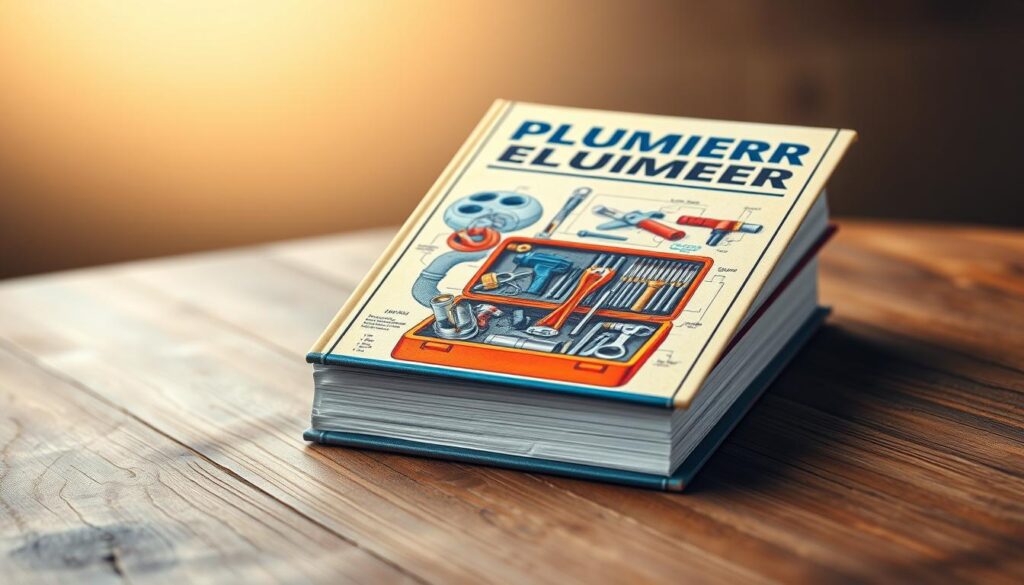
Passing the plumber licensing exam is a big step in your career. You need to plan and study well. The test has two parts: a written exam and a practical skills test.
The written exam checks your knowledge of plumbing, building codes, and safety. You’ll show you know:
- Local and national plumbing codes
- Technical drawing and blueprint reading
- Pipe installation techniques
- Safety protocols and regulations
- Materials and equipment standards
The time it takes to apply for a plumbing license varies by state. Most places require a detailed exam that tests both your knowledge and skills.
| Exam Component | Duration | Focus Area |
|---|---|---|
| Written Exam | 3-4 hours | Theoretical Knowledge |
| Practical Skills Test | 2-3 hours | Hands-on Plumbing Techniques |
To do well, spend time on comprehensive study materials, practice tests, and hands-on training. Many schools and groups offer prep courses. They help you learn what you need to know.
Good preparation is essential to pass the exam and start a great career in plumbing.
Costs and Financial Considerations
Getting a plumbing trade certification means making smart financial choices. You need to plan well and know the costs involved.
Looking into getting a state plumbing license has its own financial hurdles. These can affect your career investment.
Training Program Expenses
Plumbing education costs vary a lot. You have several options:
- Apprenticeship programs with lower upfront costs
- Trade school programs ranging from $3,000 to $15,000
- Community college technical programs
Licensing and Additional Fees
Getting your plumbing trade certification comes with several costs:
- Examination fees: $50 – $300
- Initial licensing costs: $100 – $500
- Required tool and equipment investments: $500 – $2,000
- Continuing education expenses: $100 – $300 annually
These costs might seem high, but the benefits are worth it. Licensed plumbers earn 20-30% more than unlicensed ones. This helps them pay back the initial costs quickly.
“Investing in your plumbing certification is investing in your future career success.”
Your state plumbing license timeframe affects your financial planning. Some areas have cheaper options. It’s important to research local rules to manage your budget well.
Advanced Certification and Specialization Options
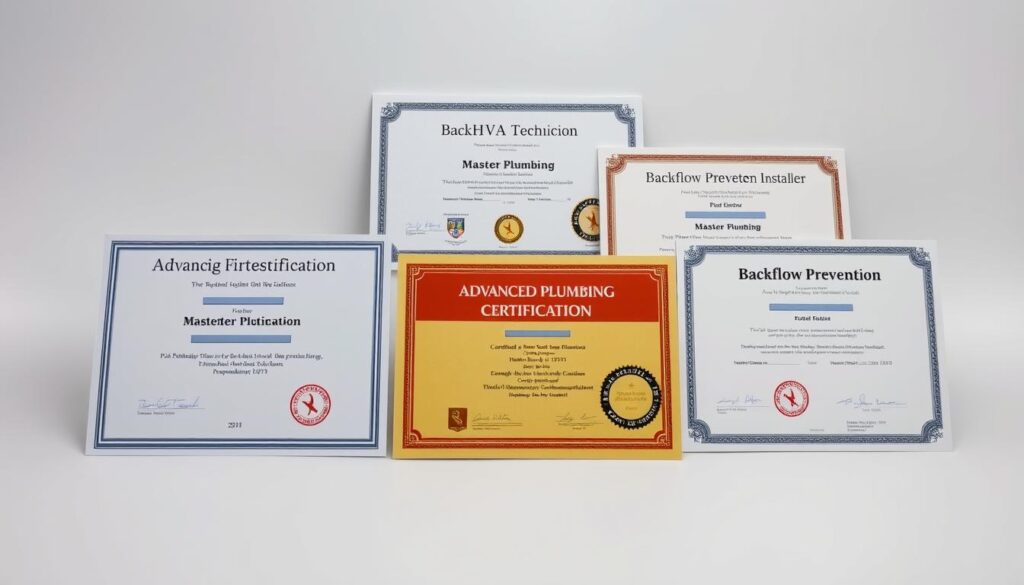
As you move forward in your plumbing career, you can get advanced specializations. These can really boost your career. The master plumber licensing process has many ways to stand out in the plumbing world.
Professional plumbers can get special certifications. These open up new chances and higher pay. They show you’re an expert in key plumbing areas.
- Medical Gas Systems Certification: Specialized training for installing and maintaining complex medical gas infrastructure in healthcare facilities
- Backflow Prevention Specialist: Advanced qualification focusing on protecting water supply systems from contamination
- Green Plumbing Practices: Certification in sustainable and environmentally friendly plumbing technologies
Getting these special certifications takes more education and training. You also need to pass tough exams. But, it’s worth it to improve your career and reputation.
Your plumbing career doesn’t stop after you get your first license. These special certifications are chances to:
- Grow your professional worth
- Find better-paying jobs
- Work in areas that are in high demand
- Show off your technical skills
By choosing to get advanced certifications, you’ll become a leading plumber. This opens up new and exciting career paths for you.
License Maintenance and Continuing Education
Keeping your plumbing license up to date is essential. It shows you’re current in the field and keeps your skills sharp. Each state has its own rules for license renewal and continuing education.
License renewal cycles are set by the state. They ensure you know the latest in plumbing standards and tech. It’s important to understand these rules to keep your career going strong.
Renewal Requirements
The renewal process for your plumbing license includes a few key steps:
- Submitting renewal application
- Paying required renewal fees
- Documenting completed continuing education hours
- Verifying current work experience
Professional Development Opportunities
Continuing education is a great way to grow your skills. You can learn about:
- New plumbing technologies
- Updated building codes
- Safety regulations
- Advanced installation techniques
States usually ask for 8 to 24 continuing education hours every few years. These hours help you stay ahead and keep your skills high.
| Education Type | Average Hours Required | Typical Renewal Cycle |
|---|---|---|
| Mandatory Courses | 12-16 hours | 2-3 years |
| Optional Specialty Training | 4-8 hours | Varies |
By managing your license well and learning continuously, you show you’re dedicated to being the best in plumbing.
Career Advancement and Income
Starting as a plumber opens doors to exciting career paths. The journeyman plumber certification timeline shows a clear way to grow. You begin as an apprentice and move up, gaining more skills and earning more.
Becoming a master plumber is the top achievement in plumbing. With hard work and learning, you can reach the top. This brings big career growth and new opportunities.
- Apprentice Level: Entry-point with supervised training
- Journeyman Level: Independent work authorization
- Master Plumber: Advanced certification and leadership roles
Your pay goes up as you move through these levels. Getting special certifications can make you more valuable and increase your earnings.
| Career Stage | Average Annual Salary | Required Experience |
|---|---|---|
| Apprentice | $35,000 – $45,000 | 0-4 years |
| Journeyman | $55,000 – $75,000 | 4-8 years |
| Master Plumber | $75,000 – $110,000 | 8+ years |
Plumbers can also start their own businesses. Starting your own plumbing business can bring in more money and give you control over your work.
Continuous learning and skill development are key to maximizing your plumbing career.
The plumbing field offers stable, fulfilling careers. It needs skilled workers in homes, businesses, and factories.
Conclusion
Getting a plumber’s license is a big step in your career. It takes about 4-6 years, but it can vary. This depends on your state’s rules, your education, and how hard you work.
How long it takes to apply for your plumbing license depends on many things. These include apprenticeships, technical school, and state rules. Every step you take gets you closer to a good job with lots of chances to grow and earn well.
Being a licensed plumber is more than just time and money. It’s a key job that keeps us healthy and our buildings safe. Knowing your state’s rules and your career goals will help you through the licensing process.
Remember, your hard work and skill will make you successful in plumbing. Your journey is about more than just passing tests. It’s about building a career that makes a difference.
